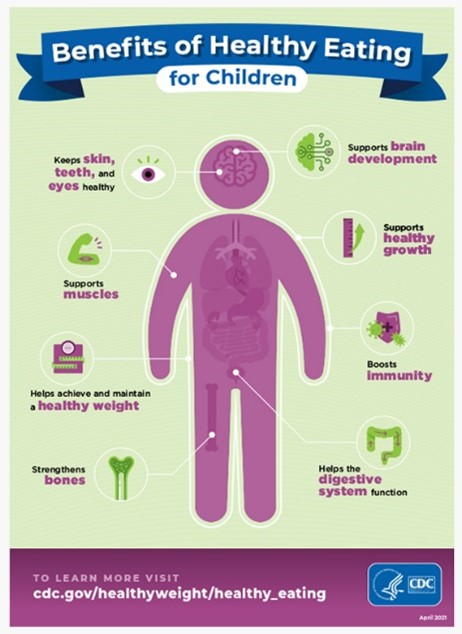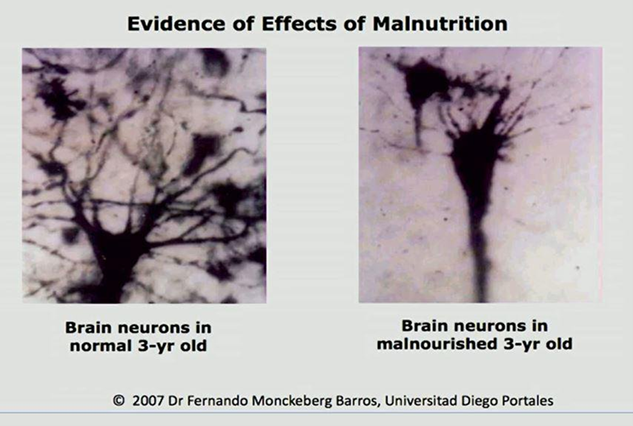Nutrition is a critical part of health and development. Good nutrition means your body gets all the nutrients, vitamins, and minerals it needs to work its best. Good nutrition considers the quality and quantity of the foods consumed. Good nutrition and healthy growth established in the first thousand days of a child’s life have benefits that will last for a lifetime.
“Nearly 1 in 3 children in America is overweight or obese.” - Healthychidren.org
“Household food insecurity was related to significantly worse general health, some acute and chronic health problems, worse health care access, and heightened emergency department use for children,”
- Taryn Morrissey, PhD
Healthy eating promotes stable energy, strong bones and teeth, improved mental health, healthy weight, and prevention of chronic diseases.

Food Insecurity
Unfortunately, 1 in 7 U.S. children lives in a household with food insecurity. Being unable to afford or obtain nutritional food has become a broader issue impacting urban, suburban, and rural areas alike. Food insecurity can lead to stress and anxiety within families. Poor nutrition and growth are related to decreased cognition, motor skills, and attention problems.

Review the page for information on the role primary care pediatricians and public health professionals play in screening and identifying children and families at risk for and experiencing food insecurity, connecting families to needed community resources, and advocating for policies that support access to adequate and healthy foods.
Obesity
Good nutrition is key for pediatric obesity prevention. Review the AAP Institute for Healthy Childhood Weight for professional education, parent and patient resources, and programs that help encourage an overall healthy lifestyle.
AAP statements
- Promoting Food Security for All Children
- Advocacy for Improving Nutrition in the First 1,000 Days to Support Childhood Development and Adult Health
Education
Recommendations
AAP recommends pediatricians promote nutrition and mitigate food insecurity at the practice level and beyond.
- Conducts screenings for food insecurity
- A 2-question validated screening tool
- Within the past 12 months, we worried whether our food would run out before we got money to buy more. (Yes or No)
- Within the past 12 months, the food we bought just didn’t last and we didn’t have money to get more. (Yes or No)
- A 2-question validated screening tool
- Educate pregnant women about breastfeeding
- Exclusive breastfeeding for the first 6 months of life
- Continuation of breastfeeding after complementary foods have been introduced for the first two years of life and beyond, if mutually desired by parent and child and family has social supports in place
- Referrals to organizations that support breastfeeding. Visit the AAP Breastfeeding page for more information.
- Refer families to community resources
- Special Supplemental Nutrition Program for Women, Infants, and Children (WIC)
WIC provides federal grants to states for supplemental foods, health care referrals, and nutrition education for low-income pregnant, breastfeeding, and non-breastfeeding postpartum women, and to infants and children up to age 5 who are found to be at nutritional risk. Read the WIC Factsheet for more details.- Understand the Income Eligibility: ≤185% of federal poverty level
- WIC food packages
- Supplemental Nutrition Assistance Program (SNAP)
SNAP provides nutrition benefits to supplement the food budget of needy families so they can purchase healthy food and move towards self-sufficiency.- Understand the Income Eligibility: <130% of federal poverty level
- Learn about eligible food items
- Browse SNAP-Ed resources for information on nutrition and recipes
- Feeding America
Feeding America provides a nationwide network of food banks as well as develops and stocks food banks and other emergency food distribution systems - Summer Food Service Program
Resource to find summer meal programs in the community and meal content - Maternal, Infant, and Early Childhood Home Visiting
States receive grants for trained home visitors to meet regularly with expectant parents and families with young children living in communities at risk for poor maternal and child health outcomes. They offer breastfeeding support and connections to community resources.
- Special Supplemental Nutrition Program for Women, Infants, and Children (WIC)
Last Updated
08/08/2022
Source
American Academy of Pediatrics